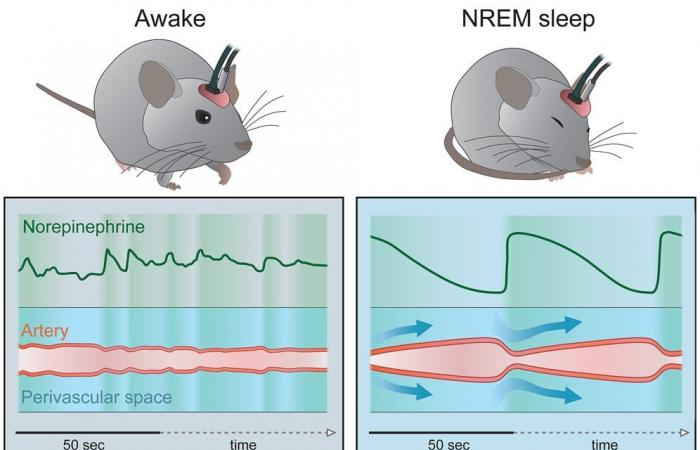⇧ [VIDÉO] You might also like this partner content
An experiment in mice reveals that slow oscillations of norepinephrine during non-REM sleep act as a pump to rid the brain of waste accumulated during wakefulness. These oscillations would cause pulsations in the blood vessels of the brain, generating a rhythmic flow of cerebrospinal fluid to evacuate waste. These results could potentially lead to new avenues of early treatment for neurodegenerative diseases.
The brain has a built-in waste disposal system called the lymphatic system, a highly organized network regulating the transport of cerebrospinal fluid (CSF). In addition to waste removal, the lymphatic system is also responsible for water homeostasis, antigen presentation and transport of immune cells to the brain, as well as the transport of useful molecules, such as glucose.
Since there are no lymphatic vessels, the lymphatic system uses the tissue interstitial space or perivascular spaces for CSF circulation. Factors such as vascular stiffness and brain injury can therefore impede glymphatic circulation and impair its purification function (lymphatic clearance), predisposing individuals to neurodegenerative diseases.
However, there is still no consensus regarding the mechanisms underlying this purification function. In 2013, researchers suggested that lymphatic clearance occurs primarily during sleep. This hypothesis has been challenged by recent work suggesting that waste disposal in the brain is greater during waking hours.
The new study co-led by the University of Copenhagen perhaps puts an end to the debate, highlighting a mechanism playing a key role in regulating the lymphatic system and activating primarily during non-REM or NREM sleep. ). According to the study’s co-lead author, Maiken Nedergaard, of the University of Rochester and the University of Copenhagen, “it’s like turning on the dishwasher before going to bed and waking up with a clean brain.” » “ We are essentially wondering what drives this process and trying to define restorative sleep based on lymphatic clearance
», he adds in reference to the study, detailed in the journal
Cell.
A pump system activated mainly during non-REM sleep
To analyze brain activity and lymphatic clearance in mice, researchers used a technique called “flow fiber photometry,” tracking lymphatic activity and blood flow both during wakefulness and sleep. .
This made it possible to avoid anesthesia which would have affected the secretion of neurotransmitters in the brain (and therefore distorted the results). “ Here we developed a method that allowed blood and CSF dynamics to be recorded during long, uninterrupted periods of wakefulness, NREM sleep, and REM sleep, avoiding the need for head fixation and allowing mice to move freely in their cage during recordings », Indicates the team in its document. Blood and CSF flows were monitored using fluorescence labeling techniques.
The team found that during NREM sleep, the mice’s brainstems release norepinephrine about every 50 seconds. This causes a rhythmic pulsation alternating contraction and dilation of blood vessels and causing blood volume to oscillate. This pulsation pattern in turn results in a rhythmic flow of CSF thus removing waste from the brain. That is, the slow oscillations of norepinephrine act as a pump regulating the flow of CSF through the brain and preventing waste products from accumulating there.
-« We may have identified the most important driver of lymphatic flow during non-REM sleep
», Says Nedergaard in an article published in the journal Science. On the other hand, norepinephrine oscillations and cerebral blood volume variations were greater during NREM sleep than during REM sleep and waking hours.
Graphical summary of the study. © Hauglund et al.
A function impaired by a common sleeping pill
The second part of the experiment was to study the effect of zolpidiem (a common sleeping pill) on the noradrenergic pumping system and lymphatic clearance. The researchers found that norepinephrine waves during sleep decreased by 50%, while CSF transport decreased by about 30% in the treated mice.
See also


« We found that the level of norepinephrine was significantly reduced and slow brain waves disappeared, reducing the effect of the lymphatic system », Explains the lead author of the study, Natalie Hauglund, of the University of Copenhagen, in a press release. “ This suggests that the sleep obtained from this sleep medication is not as beneficial as normal, restful sleep. “, she says. Further research will be needed to determine whether this effect applies to all sleeping pills.
Furthermore, previous studies have shown that sleep disorders are associated with a higher risk of dementia. Indeed, an impairment of the lymphatic system hinders the elimination of waste from the brain, including toxic molecules commonly associated with neurodegenerative diseases such as tau and beta-amyloid proteins. These results could lead to treatments occurring even before the symptoms of neurodegenerative diseases appear.
« If we could determine at an early stage that the pumping function is faulty and the patient is at risk of developing a disorder, we would be able to treat it before the patient becomes ill », concludes Hauglund.








